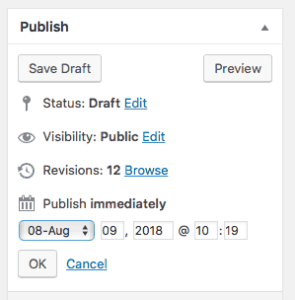In 1997 (you know, the ancient days of the interwebs) a guy named Jorn coined the term weblog. Over the next few years blogging platforms began to emerge and about 10 years ago blogging became the most prominent way information is spread online.
With the advent of social media sharing has only gotten easier and more widespread. Blogs are great and indispensable, but the question of “should my church have a blog?” is different, and a worthy question to really consider.
I want to provide a “checklist” of sorts for you to decide if you should have a church blog. And if the answer is ‘yes’ I want to give a few pointers to get all your ducks in a row as you begin.
Strap in, this is a long one! Or, you know, just click on the headings and read the parts you wanna read.
What’s in this post?
- What is a blog?
- Should My Church Start a blog?
- The Checklist
- What a blog is not
- Before we begin the blog.
- Choosing Contributors
- Creating a Posting Schedule
- Audience + Goals
- Layout for your content
- Content tips
So, what is a blog?
If you are already familiar with blogging, keep scrolling to the ‘should my church start a blog‘ checklist.Better question. Why am I even answering this in 2018? Practically everyone knows what a blog is today, whether they know how easy it is to create one or not.
Whether they’re “official” news blogs coming from a news outlet, topic-based blogs related to hobbies and food, or blogs made for mindless consumption about celebrity gossip, just about everyone has a blog that they read on a reg or come into contact with on Facebook.
I’m discussing this first because I’ve discovered that many pastors that read leadership blogs and eat up every Carey Nieuwhof post don’t realize that they can use those same tools to impact others. I’ve worked with a few churches and leaders who didn’t even realize their WordPress site had this capacity. It’s taught me to not assume what is common knowledge to me is common knowledge to others.
Maybe you’re a pastor thinking a blog is too elaborate?
Let me ask you this. Do you publish your sermons online? Then you have a blog already.
A blog is a collection of articles (or posts) published on a website. In internet world, you weekly sermon is a blog post. Any church website built on WordPress has blogging ability built into the core functionality. In fact, it’s what WordPress was initially made for.
Should My Church Start a Blog
The answer is not a resounding ‘YES!’ Surprise!
Before tackling the ‘nuts and bolts’ of blogging you really have to take a look at your capacity and decide if you can consistently post quality content.
On average, a well written post takes between 3-4 hours to create. Are you able to give about 10% of your work week consistently to creating quality content? Can it be done in less? Sure, but you’ll sacrifice quality every time.
If you don’t have a team or at least one other staff member that really helps you “run” your church you might not want to jump into this yet. In my experience if you’re the pastor that spins all the plates, or the media guy that does everything, the ‘Church blog’ plate is one of the first to fall off.
Putting my XP hat on here for a sec. Don’t get enamored with what other churches are doing with blogs and media. You may even need to unfollow some pastors and churches to avoid comparison even though you call it ‘staying up on church trends.’
Be honest with yourself and understand that blogging is not your most important platform. Focus on your preaching, your community, developing leaders/teams, and one social media platform. For you right now, blogging is not meat and potatoes. It’s icing on the cake. Put it in your back pocket, and take it out later when you have more bandwidth.
I promise I’m not trying to be negative. This is a real question to consider.
If you can’t commit to make a church blog post once a week you might be doing yourself more harm than good by starting one. Are there benefits to blogging? Sure! But those benefits only apply if you’re consistent and diligent in it.
I hate to be uber spiritual but this is a ‘suppose one of you wants to build a tower.’ moment. For this to be an effective platform, you have to be terribly consistent with it.
I have two simple mantra’s about website stuff, guys.
- Your website only works if you work it.
- Not using your blog is much worse than not having one at all.
Should I start a blog checklist.
Can I (or my team) commit to writing/posting weekly?
Are there other people I can tap on the shoulder to share the contribution load?
Do we have someone to moderate any comments/questions?
What would the purpose of our church blog be?
How would we systematize our blogging process to provide accountability?
In six months what added value could a blog give to my church?
Should we write department specific blogs?
Are there any initiatives on the church calendar that could really utilize a blog?
What a Church Blog is NOT
Sometimes understanding what something is ‘not‘ helps focus us towards what something is. I want to throw a few things out there that a church blog is not.
A rehashing of Sunday (there are 6 other days besides Sunday).
A bulletin board of the other stuff we do (use Mailchimp for that yo).
A vehicle for preaching during the week (that’s what a sermon library is for).
Don’t be that pastor or church comms guy that gets amped up about this great opportunity for sharing our stories and resources online only to become inconsistent after the first few posts when you get distracted with ‘more important church stuff.’ I promise you (from experience), someone coming to your site and seeing the two posts from 2015 is much much worse than not having one at all. It sacrifices your credibility.
Before You Begin Your Church Blog
Now that you’ve decided whether or not you should even start one and you understand what a blog is not (or maybe you just skipped to this part 😉 ), we can set ourselves up for success before launching our blog.
Decide who can contribute.
Sharing the load of blogging is a wonderful way to express the diversity of thought within your church, communicate that you are no a pastor-centric church, and empower some of your leaders and members. Work your team here. My immediate go-to’s would be my associate pastor, my family pastors (kids/youth), my discipleship pastor, and depending on their overarching role, my creative/communications director.
I don’t want to get into making sure they can actually write and setting standards for the content here.
A few good practices:
- Give them a test run. One post to see their chops.
- A good culture of feedback goes a long way.
- Turn it into a learning opportunity.
- Use it as a pathway to developing them.
Create a posting schedule.
This will help you not be that ‘two posts from 2015’ guy. Work with your contribution team to land on an agreeable posting schedule. You will need to post at least once a week to gain any meaningful traction here.
Questions to ask in this phase:
- When will I write the post?
- Who will proofread the post?
- What day do we hit publish?
- Will we have a rotation of the kind of post (video, written, audio)?
- What does our contributor rotation look like?
Having these questions answered provides accountability and expectations to everyone involved.
Decide on your target audience and goals.
Your target audience should most likely be the people that call your church home, with perhaps a secondary audience of local people that visit your website. Your audience defines your content goals.
Every series and sermon I preach has a CIS or ‘central idea of the sermon/series.’ I write better sermons when I have a focused goal that I’m trying to reach through my communication. Blogging is the same way. Have conversation around what a blog could accomplish and focus your goals on those things.
Here are some examples of goals:
- Help our church discover what it’s like following Jesus in every area of life.
- Disciple people through taking a deeper look at all of our Sunday sermons.
- Equip our people to have deeper, meaningful conversations about faith and life.
Create a layout for the posts.
Having a ‘template’ makes writing the blog easier, especially if you’re creating content across a team. Here’s a simple template for a written post.
- [Intro] This is the new “intro.” You have about 7 sentences to show someone that a post is worth reading. Writing the intro I lean into a few formulas: story time, issue (to be answered in the post), question, and ‘here’s how this post will resource you.’
- [Image] I get my images mostly from Unsplash. When you upload it give it a relevant title, description, caption and alt tag. You know, because image SEO.
- [Headings & Subheadings] Craft clear headings that section off your article and communicate the value of that section. I would try on a church blog to keep my subheadings around 2.
- [Content] You’ve heard it: content is king. Don’t put together crappy articles for your church to read. We need to create quality content that is engaging to our target audience. SEO may help someone find you, but content will ensure you keep them. Obviously, content goes under subheading right. In my content I shoot for exposition (if you’re talking bible in this post), illustration, application.
- [Conclusion] Land the plane and give an actionable next step. Always ask the question ‘what should this person be doing with what I just gave them.’
Pro Tips for Content:
- Short bursts: Simple trick that makes a big impact. Write 4 or 5 sentences, and start a new paragraph. Break up your content into ‘easy on the eyes’ chunks. Clumping stuff together in big chunks overwhelms your readers.
- Scan worthy: Most people will scan your articles. You probably scanned this one. We are conditioned to scan a post for headings and lists. Admit it, you probably did that here!
- Don’t be a robot: Write like you talk. Craft your blog to sound conversational.
- Listen to your audience: If your audience is your church then you know your audience better than most other bloggers. Listen to people’s questions, stories, wins, heartbreak. And when you sit down to write, write with that person in mind.
- Give em what they want: Preachers have a ‘captive audience’ on Sunday morning. On your blog you have like 10 seconds. 🙂 Pay attention to what kind of posts do best in your metrics, post those kinds of blogs more, and get better at crafting them.
- Plan or write in bulk. I may be working on one blogs actual content, but I have the bones of 5 or 6. It gives me time to chew on what I want them to say. It’s like preaching to me. I may be actively ‘manuscripting’ one sermon, but I am doing exegesis and sermon briefs on two others, and I have a quarterly preaching schedule so I know where I’m going.
- Check your Christianese. A church blog is maybe not the best place to break out your lexicon and highfalutin theological lingo.
Get some posts in your pipeline before starting your church blog
The first few months of making blogs for your church is mostly figuring out your timing, tweaking how you work to make it happen and probably (let’s be real) missing a few deadlines and dropping a few balls.

Use WordPress’ draft for your church blog posts.
The best way to counteract this is to get the first two months or so of your blogs ready to go before you actually launch. Take a bit or so and write your posts in advance. this will make sure you get off on the right foot and work out your church blog kinks without skipping a beat on your posting schedule.
Use WordPress’ built in publish tool to schedule when you want to publish. Basically, write eight blog posts for your church and schedule them to be published a week apart.
Post Away!
Guys, I know this is a long one! I hope that it helps you really get a handle on whether your church should should have a blog and how to jump into church blog world feeling prepared and thorough.
I’d love to see your church’s blog, know how this post helped you, and answer questions in the comments. Make sure to drop a link to your church’s blog and share your best ideas for content below!
Hey guys! I am a church leadership and creative guy living in the Atlanta area with my awesome wife and two kiddos. I've worked on staff with a number of churches as well as traveled full time as a conference speaker. Now, I work full time at The Reach Company helping ministries and businesses tell their story and make an impact online.
Make Your Church Shine!
Our goal is to help church leaders and volunteers get the most out of their WordPress site. Join our mailing list to get all the new WordPress Tools & Tuts (and the occasional WordPress deal) right in your inbox!






[…] you do, put out content! And do it at least weekly. Maybe you could check out this post on helping churches start […]